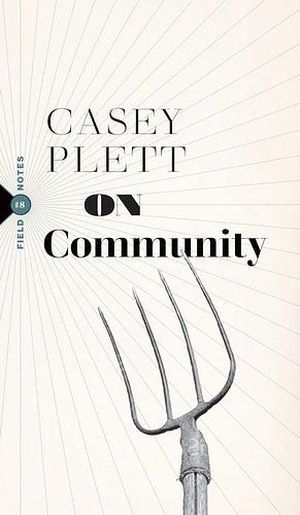What Even Is “Community,” Anyway?
⚓ Books 📅 2025-07-25 👤 surdeus 👁️ 14How many times have you heard the word “community” today? Sometimes it seems like it’s all anyone is talking about. What is it? How do we get it? Will it save us? It’s a word that is used in so many different contexts, by so many different people and organizations—from massive corporations to radical organizers—that it can sometimes feel not only meaningless, but also bewildering. I often hear people on the internet talking about how “we all need community right now,” or how “community is the most important thing.” If you find yourself craving more “community” (you’re not alone) but also feel like you have no idea what “community” even means anymore (you are definitely not alone!) then this slim book is for you.
 On Community by Casey PlettIt turns out Casey Plett has the same questions, and in this short, insightful book, she digs into them. This isn’t a comprehensive or even an in-depth book (it’s under 200 pages), and Plett doesn’t make it out to be. Rather, it’s a loose collection of Plett’s thoughts, feelings, ideas, and experiences around community. She doesn’t ever define this slippery word definitively Instead, she explores multiple definitions while making observations, telling stories, and asking questions. She’s interested in size, (small town, household, nation-station), action and intent (community as a verb), feeling (belonging, not-belonging), perception (”the trans community”), and a whole lot more. |
I love how informal and playful this book is. Plett is often quite funny. She makes jokes, addresses the reader directly, and shares all sorts of anecdotes about her own experiences of community, from the absurd to the profound. The book doesn’t feel serious, even though as she makes clear, community—in all its complicated and sometimes contradictory registers—is serious. It’s not academic in tone, even though she thinks alongside lots of other writers. It’s full of interesting ideas, but it doesn’t try to do or explore everything.
At heart, this book feels like a conversation. It made me think about my own relationship to community. I often paused while reading, to jot down a note or to text a friend. It’s an open-ended book. It’s not meant to explain community to you, the reader. It’s meant to be an invitation to think more deeply about the nebulous “community” we all seem to want but that sometimes feels so hard to actually find.
I suspect every reader will come away from this book with something different. One of the most exciting takeaways, for me, is Plett’s insistence on the neutrality of community. In the circles I run in, we often talk about community like it’s an unequivocal good. Community is how we take care of each other; it’s where we feel a sense of belonging; it’s how we’re going to survive these impossible times we’re living through. But this isn’t strictly true. Plett highlights various communities that are not unequivocally good, from Christian nationalists all moving to the same town to be near other people like them to the jovial, party-like atmosphere that rose up around anti-vax protesters in downtown Ottawa.
I don’t think community is a bad word or even a useless word. But how we do community, what we mean when we talk about community—these things matter. Plett opens the doors to so many rich conversations about what community—in all its iterations—can and cannot do.
🏷️ Books_feed